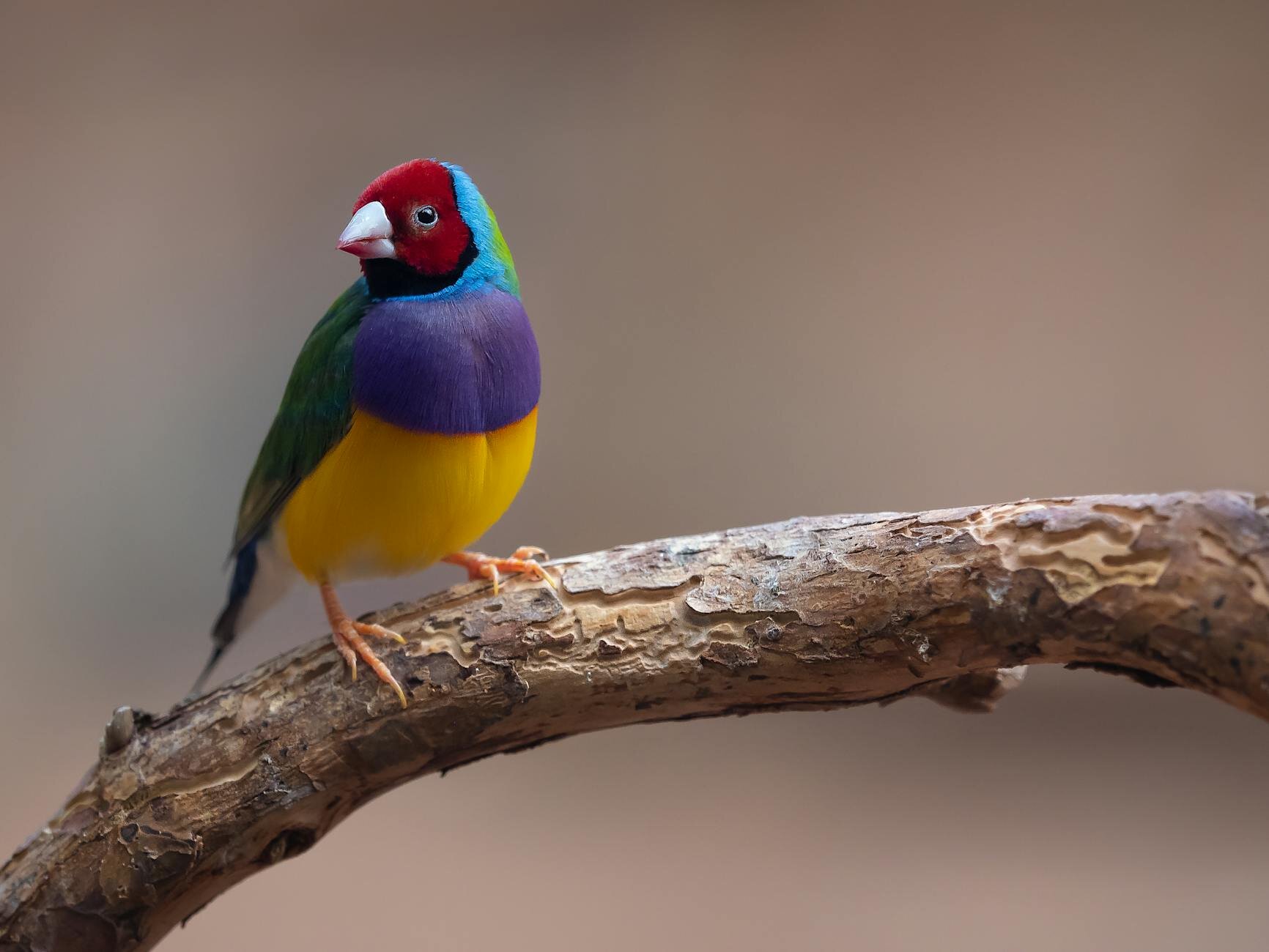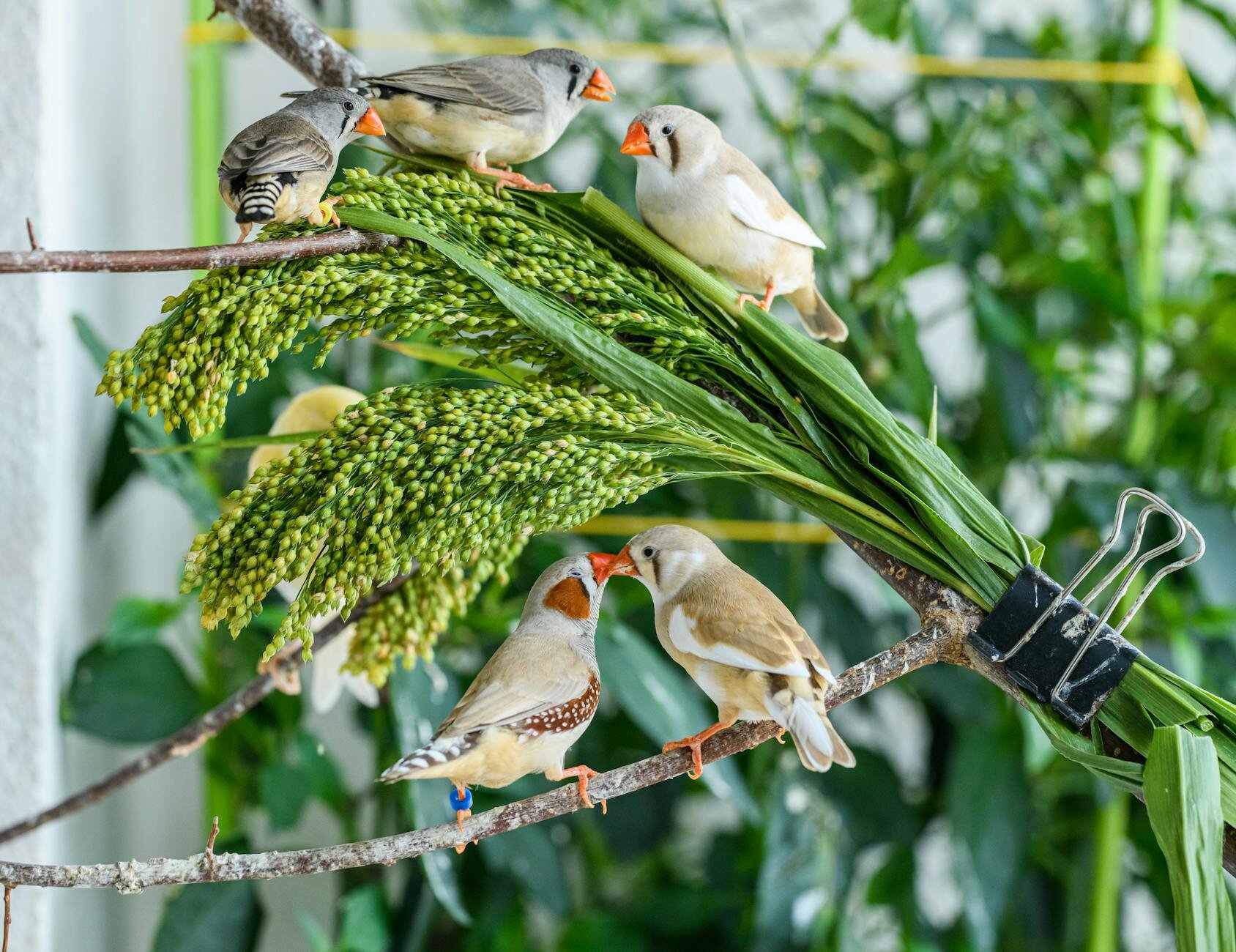Last Updated: 06/06/2025
Feeding Canaries and Finches
Learn more about how to feed Canaries and Finches correctly to promote health
Author: Dr Nicole Wynne BSc BVMS MANZCVS (Unusual Pets)
Reading Time: 18 minutes - medium read
Canaries and finches belong to a group of birds called passerines. This group of birds are commonly known as songbirds and includes small perching birds such as canaries and finches, both of which are popular pets, as well as larger birds like our corvids (magpies, crows, and ravens). Contrary to popular belief, they don't eat seed exclusively, and they have more complicated dietary requirements that need to be met to ensure they have a happy, healthy life.
Passerines require a variety of foods including fresh vegetables and fruit, fresh grass seeds, insects, and commercial bird foods including seed, pellets and crumble. Dry seed should only make up a maximum of 50% of their diet. The remaining part of their diet should consist of a mix of fresh food and pellets/crumbles.
In this article
What to feed passerines

Seed
Fresh grass seeds can be picked from your lawn in the warmer months. Birds normally love them and they are a very healthy snack! Grass seeds are ready for picking once they start to form firm seed heads, and bunches can be hung in the aviary or cage for your birds to forage from. They also make a great environmental enrichment option, promoting natural behaviours. Consider growing some in a pot and letting your birds enjoy them!
Dried seed can also be sprouted, which reduces the fat content and increases the vitamin content. Sprouted seed can be fed once the little sprouts start to turn green, usually in 2-3 days in warm weather. Whenever sprouting seed it's always important to monitor the seed closely to ensure mould doesn't develop.
Pellets
Pellets and crumbles provide protein and many nutrients including vitamins and minerals that can be lacking in seed mixes. Pellet and crumble diets for passerines also include the nutrients that are normally found in insects, as well as a concentrated source of calories that are easy to digest. Pellets and crumble formulated for passerines can also be mixed with insectivore mix for additional protein - a great trick to use during breeding season when their dietary requirements are more demanding! Dried insects can also be used as a supplement or a treat.
Fruits and Vegetables
Suitable fresh fruit and vegetables include pumpkin, sweet potato, leafy greens like spinach, celery, and bok choy, apple, carrot, peas, capsicum, and pear. Avocado, onion, garlic, and ginger are toxic to birds. Fresh food can be finely cut up or grated into a chop mix which can then be refrigerated for up to a week, or can be fed as whole pieces of fruit and vegetables for them to nibble on.
Treats
Great treats include millet sprays and sweeter fruits like berries, peach, grapes, and banana. Treat foods can be given a couple times a week and only in small amounts. Millet sprays and seed sticks should be removed after an hour, and placed back in the next week, as birds will selectively choose to eat these treats over healthier foods, just like us! Remember to remove millet sprays and seed sticks which have been contaminated with faeces.
Wombaroo Insectivore Rearing Mix
A high protein formula for insectivorous and carnivorous birds. This is suitable for canaries and finches as an occasional treat. A small pinch be sprinkled onto food as a topper once or twice a week. The high protein content is particularly beneficial during high stress periods like moulting, breeding or illness.
Trill Canary and Finch Mix
These specially selected seeds cater to the nutritional needs of canaries and finches. It contains a blend of canary seed, french millet, canola seed and vitamins.
Vetafarm Finch and Budgie Crumbles
The Vetafarm Finch & Budgie Crumbles offer complete nutrition tailored to meet the needs of finches and budgerigars throughout all life stages, including breeding and chick rearing, to maintain optimal health.
How to feed passerines

Feeding accessories
Stainless steel feeding and water bowls are more hygienic than plastic bowls, as plastic bowls accumulate tiny scratches throughout their life, which then harbour harmful bacteria and are difficult to clean. It is best to get uncomplicated bowls and dishes, and avoid hooded dishes or feeders with multiple components as they don't stop your birds from being messy, and they're impossible to clean. Consider adding bird specific cleaning disinfectants to your home routine to help maintain freshness when sprouting seed and general cleaning of feed containers and cages.
We recommend having 3-4 sets of dishes and bowls for your birds so they can be easily cleaned and replaced twice a day. They also allow you to easily mix foods. For example, seed and pellets can be mixed up with vegetable and fruit chop.
Multiple fresh water stations should always be available, and avoid placing food and water feeders under perches, as they are more likely to become contaminated with waste.
Birdie Stainless Steel Coop Cup
These stainless steel coop cups are easy to use and remove allowing for quick cleaning. They're also designed to be dishwasher safe and made from high quality stainless steel to prevent rust. This cup can be safely clamped inside your birds cage and have smooth rolled edges for safety.
JW Insight Millet Spray Holder
This durable plastic holder easily hooks onto the cage and is designed to keep your birds tasty millet spray in place while they eat.
Ipetz Hanging Drinker
This 2L galvanised hanging drinker is an excellent option for use in aviaries to keep drinking water off the ground
Using food as enrichment
Little birds need environmental enrichment too! Passerines forage for large amounts of time in the wild, and it is easy to create similar opportunities for pet birds. A shallow plastic cat litter box can be filled partway with dry leaves, hay, grass, or shredded paper, and their daily ration of dry seed can be sprinkled over, providing hours of entertainment!
Snuffle mats designed for dogs and cats are also a great way of getting birds to forage and look for their food.
Bird-specific toys include hanging food foragers that can be used to feed sweeter fruit, encouraging birds to fly up to take bites.
Finally, natural foliage and native grasses act as a beautiful enrichment item, and fresh fruit and vegetables can be hidden amongst the leaves. Do ensure that natural branches and leaves are hosed off and thoroughly sun-dried before using.
Super Bird Fiesta Millet Holder
This colourful foraging toy is perfect for small birds. Providing forage toys helps to keep your bird physically and mentally active. Simply hide a spray of millet inside to give your bird a mental challenge that will help to alleviate boredom and frustration.
Harmony Mealworms
These dried mealworms are the perfect high protein occasional snack for canaries and finches and are a great source of enrichment.
Super Bird Mini Flying Trapeze Swing
Many birds enjoy the sensation of being on a swinging perch. This is also made from natural material that is safe for your bird to chew.
Further Reading
Want to read more? Check out our other articles:
Why Your Bird Should be Eating Pellets
History
Our experts continually monitor the health and wellness space and we update our articles when new information becomes available.
Fri Jun 6 2025
Edited by Dr Teagan Lever BVSc (Hons)Medically reviewed by Dr Olivia Clarke BSc BVMS MANZCVS (Unusual Pets, Avian)Dr Nicole Wynne BSc BVMS MANZCVS (Unusual Pets)
Veterinarian, MANZCVS (Unusual Pets)
Dr. Nicole graduated from Murdoch University in WA in 2014, and immediately started working in exotics-only practice. She was also one of the few vets in Australia that would routinely see venomous snakes ranging from death adders to tiger snakes. Although Dr. Nicole enjoys seeing all exotic pets, her absolute favourite are rabbits. She passed her Australian and New Zealand College of Veterinary Scientists Membership (MANZCVS) exam in unusual and exotic pets in 2021.

